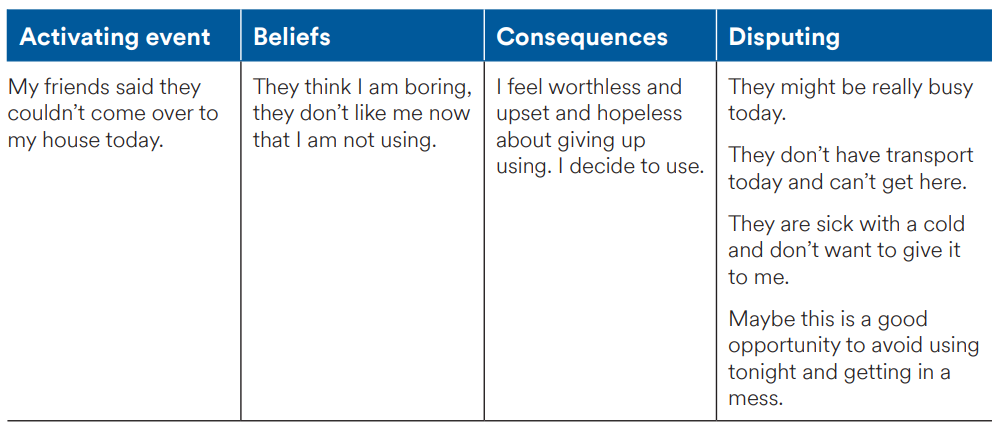How we think about things can have a big effect on our feelings and how we behave.
Our thoughts and beliefs often come from things that have happened in the past and can be helpful or unhelpful. Unhelpful thoughts and beliefs may make us feel worthless, sad, stressed, angry or anxious.
These unhelpful thoughts and feelings can lead us to behave in unhelpful ways.
Unhelpful thoughts can lead to craving – and giving in to that craving.
Let’s look at an example.
Consider the following situation:
After a hard day at work, you are feeling tired and stressed.
Some common unhelpful ways of thinking about the situation might include:
Extremes
Thinking something either is all good or all bad. For example:
“I made a mistake so I am a stupid person who can’t do anything right”
“I had one argument with my partner so I am a bad partner”
“I used once this week, I am a failure who can’t change – it’s hopeless”
Over generalising
Assuming that if something bad has happened in the past it will always happen – forgetting the times when it didn’t; or thinking that because one person didn’t like you that nobody does. For example:
“I can’t trust anybody, people always let you down”
“I always lose”
“I never get anything right”
“Everyone thinks I am an idiot”
Catastrophizing
Imagining the worst-case scenario. For example:
“I have a headache, I must have a brain tumour”
“I’ll never get a job, I will end up living on the street”
Mistaking feelings for facts
Just because you feel something it doesn’t mean it is true. For example:
“I feel like a failure so I am a failure”
Minimising
Underselling your good qualities. For example:
“I’m not clever, I was just lucky when I
did well”
Demands
Should, ought, must – for example:
“I ought to feel happy all the time”
“I must do things perfectly every time”
“Everyone should treat me with respect at all times”
Personalising
Blaming yourself for unpleasant events and other people’s feelings and behaviours. For example;
“It is all my fault that my friend didn’t enjoy the party, I must have done something wrong”
Jumping to conclusions
Mindreading. For example:
“I won’t try to do that because I know I will fail”
“I saw my friends across the road and waved but they didn’t wave back, they must hate me”
You can use the ABCDs to help you challenge your unhelpful thoughts and
beliefs.
Activating event or situation – what is the situation?
Beliefs – what were your thoughts when the event was happening?
Consequences – How did you end up feeling and what did you end up doing? What happened?
Disputing – are your beliefs true? What other explanations might there be? What evidence do you have for your thoughts? Is there another way you could think about this? What would be a more helpful
thought?
When you have disputed your unhelpful thoughts write down your new helpful thought.
Example
It is important to practice your ABCDs regularly to help you recognize and challenge unhelpful thoughts.
Now that you know how to challenge unhelpful thoughts, here are some related sheets that you might also find useful:
How to cope with cravings
How to be assertive
How to handle high-risk situations
How to prepare for and respond to a slip
How to manage a slip
How to practice mindfulness





